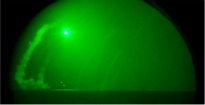Bombers Destroy Libyan Airfield
 The New York Times reports:
The New York Times reports:
A day after American and European forces began a broad campaign of strikes against the government of Col. Muammar el-Qaddafi, the Libyan leader delivered a fresh and defiant tirade on Sunday, pledging retaliation and saying his forces would fight a long war to victory.
He was speaking in a telephone call to state television, which, apparently for security reasons, did not disclose his whereabouts. The Libyan leader has not been seen in public since the United States and European countries unleashed warplanes and missiles in a military intervention on a scale unparalleled in the Arab world since the Iraq war. On Sunday, American B-2 stealth bombers were reported to have struck a major Libyan airfield.
In a first assessment from Washington, Adm. Mike Mullen, the chairman of the Joint Chiefs of Staff, said the first day of “operations yesterday went very well,” news reports said. Speaking to NBC’s Meet the Press he said a no-fly zone over Libya to ground Colonel Qaddafi’s warplanes — a prime goal of the attacks — was “effectively” in place and that a loyalist advance on the eastern rebel stronghold of Benghazi had been halted.
Despite those major setbacks, Colonel Qaddafi said his forces on the ground would win in the end. And he repeated an assertion made on Saturday that he had opened military depots to his supporters and the Libyan people were now fully armed. Instead of an image of the Libyan leader, state television showed a statue of a golden fist clutching a crumpled American fighter plane, a monument to an American strike on his compound in 1986.
Speaking of a “long war,” Colonel Qaddafi said: “We will not leave our land and we will liberate it.”
“We will fight you if you continue your attacks on us,” he Qaddafi said. “Those who are on the land will win the battle,” he declared, warning without explanation that “oil will not be left to the United States, France and Britain.”
The mission to impose a United Nations-sanctioned no-fly zone was portrayed by Pentagon and NATO officials as under French and British leadership.
But the Pentagon said that American forces took the lead in the initial campaign to knock out Libya’s air defense systems, firing volley after volley of Tomahawk missiles from nearby ships against missile, radar and communications centers around Tripoli, the capital, and the western cities of Misurata and Surt.
Early on Sunday, the sound of antiaircraft fire and screaming fighter jets echoed across Tripoli, punctuated by heavy explosions. Muhammad Zweid, secretary of the Libyan Parliament, said the intervention had “caused some real harm against civilians and buildings.” But he declined to specify which civilian buildings or locations were hit. And other officials took pains on Saturday to show reporters a group of civilians they portrayed as volunteers who had flocked to Mr. Qaddafi’s compound to shield him from the attacks.
In the rebel-held east, Benghazi seemed quiet after fighting on Saturday that inspired a panicky exodus by thousands of residents. Hundreds of cars streamed back into the city from towns further east on Sunday, finding long fuel lines, and barricades of debris on main roads. A tire repair store and a butcher shop had reopened, but most shops were shuttered.

